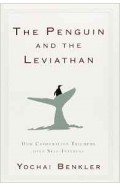The Penguin and the Leviathan
By: Yochai Benkler
-
Rs 355.50
- Rs 790.00
- 55%
You save Rs 434.50.
Due to constant currency fluctuation, prices are subject to change with or without notice.
We are offering a high discount due to slightly damage.
What do Wikipedia, Zip Car’s business model, Barack Obama's presidential campaign, and a small group of lobster fishermen have in common? They all show the power and promise of human cooperation in transforming our businesses, our government, and our society at large. Because today, when the costs of collaborating are lower than ever before, there are no limits to what we can achieve by working together.
For centuries, we as a society have operated according to a very unflattering view of human nature: that, humans are universally and inherently selfish creatures. As a result, our most deeply entrenched social structures – our top-down business models, our punitive legal systems, our market-based approaches to everything from education reform to environmental regulation - have been built on the premise that humans are driven only by self interest, programmed to respond only to the invisible hand of the free markets or the iron fist of a controlling government.
In the last decade, however, this fallacy has finally begun to unravel, as hundreds of studies conducted across dozens of cultures have found that most people will act far more cooperatively than previously believed. Here, Harvard University Professor Yochai Benkler draws on cutting-edge findings from neuroscience, economics, sociology, evolutionary biology, political science, and a wealth of real world examples to debunk this long-held myth and reveal how we can harness the power of human cooperation to improve business processes, design smarter technology, reform our economic systems, maximize volunteer contributions to science, reduce crime, improve the efficacy of civic movements, and more.
We are offering a high discount due to slightly damage.
What do Wikipedia, Zip Car’s business model, Barack Obama's presidential campaign, and a small group of lobster fishermen have in common? They all show the power and promise of human cooperation in transforming our businesses, our government, and our society at large. Because today, when the costs of collaborating are lower than ever before, there are no limits to what we can achieve by working together.
For centuries, we as a society have operated according to a very unflattering view of human nature: that, humans are universally and inherently selfish creatures. As a result, our most deeply entrenched social structures – our top-down business models, our punitive legal systems, our market-based approaches to everything from education reform to environmental regulation - have been built on the premise that humans are driven only by self interest, programmed to respond only to the invisible hand of the free markets or the iron fist of a controlling government.
In the last decade, however, this fallacy has finally begun to unravel, as hundreds of studies conducted across dozens of cultures have found that most people will act far more cooperatively than previously believed. Here, Harvard University Professor Yochai Benkler draws on cutting-edge findings from neuroscience, economics, sociology, evolutionary biology, political science, and a wealth of real world examples to debunk this long-held myth and reveal how we can harness the power of human cooperation to improve business processes, design smarter technology, reform our economic systems, maximize volunteer contributions to science, reduce crime, improve the efficacy of civic movements, and more.
The Penguin and the Leviathan: How Cooperation Triumphs over SelfInterest
By: Yochai Benkler
Rs 693.75 Rs 925.00 Ex Tax :Rs 693.75
Zubin Mehta: A Musical Journey (An Authorized Biography)
By: VOID - Bakhtiar K. Dadabhoy
Rs 472.50 Rs 1,050.00 Ex Tax :Rs 472.50
From Mutiny to Mountbatten: A Biographical Sketch and Writings by Altaf Husain, Former Editor of DAWN
By: Zeba Zubair
Rs 375.00 Rs 500.00 Ex Tax :Rs 375.00
The Age of Genius: The Seventeenth Century and the Birth of the Modern Mind
By: A. C. Grayling
Rs 1,812.25 Rs 3,295.00 Ex Tax :Rs 1,812.25
Ibn Arabiand Modern Thought The History of Taking Metaphysics Seriouly
By: Peter Coates
Rs 487.50 Rs 750.00 Ex Tax :Rs 487.50
Forced Marriage: Introducing a Social Justice and Human Rights Perspective
By: Aisha K Gill
Rs 4,947.25 Rs 8,995.00 Ex Tax :Rs 4,947.25
Experiment At Work: Explosions and experiences at the most frightening company on earth
By: Andy Law
Rs 184.00 Rs 1,840.00 Ex Tax :Rs 184.00
Heartbroken Open: A Memoir Through Loss To Self-discovery
By: Kristine Carlson
Rs 312.75 Rs 695.00 Ex Tax :Rs 312.75
The Oneworld Book of Prayer : A Treasury of Prayers from Around the World
By: Juliet Mabey
Rs 112.40 Rs 1,124.00 Ex Tax :Rs 112.40
From Mutiny to Mountbatten: A Biographical Sketch and Writings by Altaf Husain, Former Editor of DAWN
By: Zeba Zubair
Rs 375.00 Rs 500.00 Ex Tax :Rs 375.00
The Age of Genius: The Seventeenth Century and the Birth of the Modern Mind
By: A. C. Grayling
Rs 1,812.25 Rs 3,295.00 Ex Tax :Rs 1,812.25
Ibn Arabiand Modern Thought The History of Taking Metaphysics Seriouly
By: Peter Coates
Rs 487.50 Rs 750.00 Ex Tax :Rs 487.50
No recently viewed books available at the moment.
Zubin Mehta: A Musical Journey (An Authorized Biography)
By: VOID - Bakhtiar K. Dadabhoy
Rs 472.50 Rs 1,050.00 Ex Tax :Rs 472.50
The Penguin and the Leviathan: How Cooperation Triumphs over SelfInterest
By: Yochai Benkler
Rs 693.75 Rs 925.00 Ex Tax :Rs 693.75
From Mutiny to Mountbatten: A Biographical Sketch and Writings by Altaf Husain, Former Editor of DAWN
By: Zeba Zubair
Rs 375.00 Rs 500.00 Ex Tax :Rs 375.00
The Age of Genius: The Seventeenth Century and the Birth of the Modern Mind
By: A. C. Grayling
Rs 1,812.25 Rs 3,295.00 Ex Tax :Rs 1,812.25
Ibn Arabiand Modern Thought The History of Taking Metaphysics Seriouly
By: Peter Coates
Rs 487.50 Rs 750.00 Ex Tax :Rs 487.50














-120x187.jpg?q6)


















